Do you want a solar cooker?
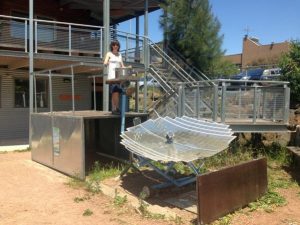
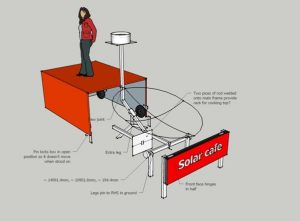 CERES is looking to donate a solar steam cooker and a solar ray cooker. The cooker is functional and can be used for either sustainability events or for day-to-day use. The pictures suggest that we are talking something big. But be quick, and it might already have gone, as we were told about it on Friday. If interested, email Andy Burns.
CERES is looking to donate a solar steam cooker and a solar ray cooker. The cooker is functional and can be used for either sustainability events or for day-to-day use. The pictures suggest that we are talking something big. But be quick, and it might already have gone, as we were told about it on Friday. If interested, email Andy Burns.
Swap your food for your library fines
Yarra Plenty Regional Library (which covers Banyule, Nillumbik and Whittlesea) have partnered with Foodbank Victoria to run a Food For Fines program from now until 17th December. Donate some non-perishable food and they will remove any fines from your library card. Also, return any items and no fines will apply – even if it has been years.
Identify those critters in your garden
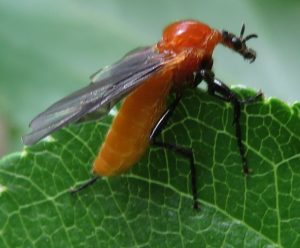 I’ve mentioned this before but it’s such a good service that I’m going to mention it again. Send your photo to Museums Victoria and they (or more precisely, someone called Simon) will identify the animal for you. So, for example, the picture right is apparently of a type of gnat called a march fly (Bibio imitator).
I’ve mentioned this before but it’s such a good service that I’m going to mention it again. Send your photo to Museums Victoria and they (or more precisely, someone called Simon) will identify the animal for you. So, for example, the picture right is apparently of a type of gnat called a march fly (Bibio imitator).
Corrections and clarifications
The Spring backyard composting workshop on Saturday, 24th November, 10.30am-12.30pm is in Heidelberg Heights, not Fitzroy. Sorry Jen and Mikoto.
Charlie Mgee is coming back to Eltham! (well, Research actually)
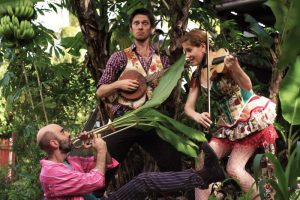 Some of you will remember Sunday, 25th May 2014 as the day when Charlie last visited this area with his ukulele and unique vocals about vegetables. Well, he’s coming back on Tuesday, 18th December, and he’s coming with the rest of the Formidable Vegetable band to play a 3-hour concert. Read more.
Some of you will remember Sunday, 25th May 2014 as the day when Charlie last visited this area with his ukulele and unique vocals about vegetables. Well, he’s coming back on Tuesday, 18th December, and he’s coming with the rest of the Formidable Vegetable band to play a 3-hour concert. Read more.
News about local food producers
My wife thinks that it is important for you to know that Healthybake, from Lilydale, now make hemp sourdough bread.
Backyard Honey, from Surrey Hills, have a new outlet: the first small-format ‘local neighbourhood supermarket’ by Coles, which is in Surrey Hills and has just opened.
The Mrs & Co, from Mount Evelyn, are now a stallholder at the weekly moonlit markets at Eastland.
Angela Gioffre, from Organic Empire in Mount Evelyn, recently posted this on Facebook: “Something happens when you have children, I don’t know that I valued health or prioritised it before the boys came along. They lit a candle inside of me … and like all parents we just want our babies to be healthy and safe … I found organic food … it made so much sense to eat without chemicals. I was so completely dumbfounded that we had eaten any other way, without thought. I became consumed with understanding food, every waking moment was spent reading and learning about how food works in our bodies. I then turned that into formal qualifications, studying for a further three years and becoming a nutritionist. I realised that food is the answer to all of our problems, and at the same time it can be the problem with everything. Food brings people together, it nourishes, it heals, but sadly it also has the capacity to poison, to destroy … it was at that moment that Organic Empire began … I wanted everyone to know how good it felt to feel good, to feel alive and healthy and strong … because eating organic food does that.“
Local food producers in the news
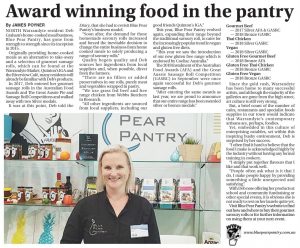 Deb Graham, from Blue Pear Pantry in North Warrandyte, featured in the November edition of The Warrandyte Diary.
Deb Graham, from Blue Pear Pantry in North Warrandyte, featured in the November edition of The Warrandyte Diary.
Permablitz’s hero of the month – Ebbings silverberry
Is Ebbings silverberry the perfect permaculture plant? Well, it ticks a lot of boxes – nitrogen fixer, tough evergreen shrub, makes a good hedge or windbreak, is a useful dense habitat, edible fruit, has perfumed white flowers, is a bee plant … what more could you want?
Read all Permablitz’s heroes of the month.
Where to buy books
Following previous discussions about where to buy Karen Sutherland’s book about tomatoes, Carol Clethero has written in to comment: “the best option for the economy is to purchase from local bookstores but failing that, if a local bookstore doesn’t exist nearby or mobility is an issue, Booktopia and Fishpond are the next best options. Booktopia is an Australian company that pays tax and their profits stay in Australia. Fishpond, whilst New Zealand owned, has a branch in Australia, pays local taxes and abides by local employment law. Amazon (including the Book Depository) is the worst option in my opinion as it pays its staff relatively little, has bad working conditions and moves its profits around to avoid paying taxes – see this recent article in the Guardian.“
Fun facts: bananas
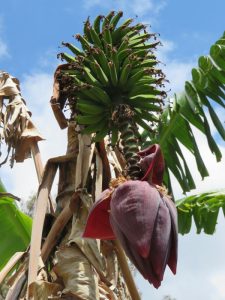 If you have a banana plant, and you protected it from the frost, then it might well now be bearing bananas. But these bananas won’t have been pollinated. How come?
If you have a banana plant, and you protected it from the frost, then it might well now be bearing bananas. But these bananas won’t have been pollinated. How come?
What is the purpose of a fruit?
The purpose of a fruit is to be eaten by an animal who, at a later time and hopefully elsewhere, excretes the seeds that were contained within the fruit and thus helps the plant to disperse.
Bananas are seedless, so what is the purpose of a banana?
A banana has no purpose. Banana plants, like mules, are sterile.
So, why do bananas exist?
Bananas exist only because humans like eating them. X thousand years ago, a mutant banana plant whose bananas were seedless serendipitously happened to come into existence. A human happened to eat its bananas and thought “yum”. This human happened to be an ur-agriculturalist and he/she happened to take suckers from the plant and grow them. Their progeny or equivalent happened to do the same thing, and so on, thus replacing natural dispersal mechanisms via seed with artificial dispersal mechanisms via sucker.
Where does pollination fit in?
Pollination doesn’t fit in. Because bananas are seedless then, by definition, they are not pollinated.
So, what is the purpose of the male flowers on banana plants?
Male banana flowers have no purpose. They are, like emu wings, just a hangover from history.
How does the banana grow if it is not pollinated?
It is true that fruit usually only grow if the seeds that they contain have been pollinated. But this is because natural selection acts against it (it has costs but no benefits) rather than because there is a biological law which prevents it. After all, it is never the fruit itself that is being pollinated. There will have been many mutant banana plants which had undeveloped seedless bananas, but no ur-agriculturalist ever said “yum” and propagated them, so they no longer exist.
Nerdy aside: when the fruits develop without any pollination, this is called parthenocarpy. As well as bananas, it happens with some figs, pineapples and other plants.
Read some other fun facts such as which animals eat (or, more precisely, used to eat) avocados and excrete their pits.
Which link was clicked most times in the last newsletter?
The cancellation of the Hurstbridge Farmgate garden tour.
Joke of the week
Why did the greengrocer sell both green and purple cabbage? Because two heads are better than one.
As a bonus, here is the latest joke of the month from the Nillumbik U3A newsletter:
A bus driver was driving a whole tour bus of elderly men and women down a highway. As he was driving, one of the little old ladies tapped him on the shoulder to offer him a handful of peanuts that he gratefully accepted.
15 minutes passed and she comes back with another handful of peanuts. This happens about five more times. The bus driver finally decides to ask her, “Why don’t you eat the peanuts yourself?“
She replied “We have no teeth so we aren’t able to chew them.“
Confused, he asks, “If you can’t chew them, why do you buy them?“
She replied “We get them just for the chocolate around them. We love it!“
New events
Propagation workshop
What: Rachel Bishop, from Beales Road Farm, will show you how to propagate from seed.
When: Thursday, 15th November, 6.30-8pm.
Where: Edendale.
Cost: $5.
Bookings: EventBrite.
Further information: LFC calendar entry.
Convivial Kitchen: beeswax wrap making workshop
What: Why not cut down on wrapping and switch to beeswax wraps instead? They are great as lids, to wrap cheese, keep avocado fresh, and wrap up your bread. This workshop will teach you how to make them, and you will take five home with you. Please bring some washed ironed cotton to use (a larger piece to cut into smaller pieces, or a number of different sized smaller pieces) and they will provide the rest of the ingredients.
When: Sunday, 18th November, 2-4pm.
Where: Preston.
Cost: $20.
Bookings: EventBrite.
Further information: LFC calendar entry.
Build your own take home garden box (4 sessions)
What: You will: create and maintain your own take home garden box; improve your landscaping and horticulture skills; improve your understandings of ecosystems; and learn about working with recycled timbers.
When: The four Wednesdays starting 21st November, each 10am-2pm.
Where: Brunswick.
Cost: $10.
Bookings: EventBrite.
Further information: LFC calendar entry.
Fruit tree pruning workshop with Chris England
What: Presenter Chris England. An introductory lecture will be followed by a hands-on workshop. Using the demonstration fruit trees in the orchard of the Burnley Gardens, you will learn to summer prune fruit trees to get maximum fruit. Chris will also demonstrate how to get fruit on espalier fruit trees. BYO secateurs.
When: Saturday, 1st December, 9.30am-12.30pm.
Where: Richmond.
Cost: $65.
Bookings: TryBooking.
Further information: LFC calendar entry.
Backyard quails at The Plummery
What: You will visit with Kat Lavers’ bevy of quails which tie together her permaculture kitchen garden. You will learn all about quail care, including housing, feeding and how they can work to support a garden system.
When: Saturday, 1st December, 10-11.30am.
Where: Northcote.
Cost: $30.
Bookings: TryBooking.
Further information: LFC calendar entry.
Permaculture kitchen garden at The Plummery
What: You will explore Kat Lavers’ permaculture kitchen garden to learn how such a small space has been able to provide over 350kg of food in a single year. This session will focus on how to get more out of a small space with less work by incorporating permaculture design principles and thoughtful planning.
When: Saturday, 1st December, 1-2.30pm.
Where: Northcote.
Cost: $30.
Bookings: TryBooking.
Further information: LFC calendar entry.
Indigenous plants for food and medicine
What: What you will learn: traditional Indigenous lifestyles and healing practices pre European settlement; traditional ways of using various Indigenous plants for medicinal purposes; and promising new research into their potential medical applications. Presented by Gaby Harris. Indigenous Australians have been using native plants and animals for tens of thousands of years as sources of food and medicine. With European settlement much of this knowledge was lost or ignored, but there is now growing interest in relearning these traditional healing methods. More research is being carried out to see how we can grow, harvest and utilise our Indigenous plants for foods, medicines, cosmetics and more. This class will introduce you to some of the well-known, as well as some more obscure, Indigenous Australian plants, teach you how they were once used, and how you can use them now. You will be able to see, smell and taste a variety of these amazing plants and learn where you can find them and how to cook with them.
When: Saturday, 15th December, 9.30am-12.30pm.
Where: Bulleen Art and Garden.
Cost: $55.
Bookings: WeTeachMe.
Further information: LFC calendar entry.
Formidable Veg Melbourne permie house concert
What: Join Formidable Vegetable for an intimate pre-solstice permie-party. Arrive 6pm for a 6.30 start. BYO picnic dinner (lots of places in the garden to picnic). Listen to their well-known song, Yield. Listen to more of their music. Watch a sample video.
When: Tuesday, 18th December, 6-9pm.
Where: Research.
Cost: $30 ($20 concession).
Bookings: EventBrite.
Further information: LFC calendar entry.
Summary of upcoming events
Over the next week
- Raised garden beds are for everybody: Wednesday, 14th November, 11am-midday.
- Join the development of the Newton Street Community Garden: Thursday, 15th November, 4.30-6pm.
- Propagation workshop: Thursday, 15th November, 6.30-8pm.
- Plant-based midweek cooking class: Thursday, 15th November, 6.30-8.30pm.
- Bush foods & herbs for courtyards & balconies: Thursday, 15th November, 6.30-9pm.
- Kombucha workshop: Thursday, 15th November, 7-8pm.
- War on food waste workshop and talk: Thursday, 15th November, 7-8pm.
- Festive inspired cooking master class: Thursday, 15th November, 7-9pm.
- Festive inspired cooking master class: Friday, 16th November, 7-9pm.
- Become a junior chocolatier: Saturday, 17th November, 9-9.45am.
- Summer veggie garden success!: Saturday, 17th November, 10-11.30am.
- Shio koji making and cooking: Saturday, 17th November, 11am-1.30pm.
- Halloumi Festival Melbourne: Saturday, 17th November, midday-9pm.
- Chocolate discovery class: Saturday, 17th November, 12.45-1.45pm.
- Beekeeping workshop with Ben: Saturday, 17th November, 2-5pm.
- Introduction to natural beekeeping (two-day): Saturday, 17th November and Sunday, 18th November, both 10am-5pm.
- Miso paste making: Sunday, 18th November, 11am-1.30pm.
- Healthy lives plant-based cooking: Sunday, 18th November, midday-4pm.
- Halloumi Festival Melbourne: Sunday, 18th November, midday-9pm.
- Convivial Kitchen – beeswax wrap making workshop: Sunday, 18th November, 2-4pm.
- Julie and Julia (film): Monday, 19th November, 10.15am-12.30pm.
- Build your own take home garden box (4 sessions): starting 21st November, 10am-2pm.
Over the next month
- Sylvester Hive presents Buzz & Dig – native bee workshop: Thursday, 22nd November, 6-8.30pm.
- Healthy productive compost and worms: Thursday, 22nd November, 6.30-9pm.
- No Waste Cook Club Carlton: Saturday, 24th November, 10am-midday.
- Home brewing with Paul Rigby: Saturday, 24th November, 10am-3pm.
- Bee hive tour: Saturday, 24th November, 10.30am-12.30pm.
- Spring backyard composting workshop: Saturday, 24th November, 10.30am-12.30pm.
- Cook Indian by the creek: Saturday, 24th November, 4-7pm.
- Backyard beekeeping workshop: Tuesday, 27th November, 7-8.30pm.
- Heidi garden club: Wednesday, 28th November, 10am-midday.
- Festive inspired cooking master class: Thursday, 29th November, 7-9pm.
- Cook Indian by the creek: Friday, 30th November, 6.15-7.45pm.
- Festive inspired cooking master class: Friday, 30th November, 7-9pm.
- Summer fruit tree maintenance: Saturday, 1st December, 9.30am-12.30pm.
- Fruit tree pruning workshop with Chris England: Saturday, 1st December, 9.30am-12.30pm.
- Become a junior chocolatier: Saturday, 1st December, 10-10.45am.
- Backyard quails at The Plummery: Saturday, 1st December, 10-11.30am.
- Advanced composting workshop: Saturday, 1st December, 10am-midday.
- No Waste Cook Club Fitzroy: Saturday, 1st December, 10am-midday.
- Miso paste making: Saturday, 1st December, 11am-1.30pm.
- Christmas gingerbread house demonstration: Saturday, 1st December, midday-1.30pm.
- Permaculture kitchen garden at The Plummery: Saturday, 1st December, 1-2.30pm.
- Beeswax food wraps: Saturday, 1st December, 2-4pm.
- Healthy lives plant-based cooking: Sunday, 2nd December, midday-4pm.
- Plant-based midweek cooking class: Thursday, 6th December, 6.30-8.30pm.
- Festive inspired cooking master class: Thursday, 6th December, 7-9pm.
- Festive inspired cooking master class: Friday, 7th December, 7-9pm.
- Raw living whole foods with Valentina Rise: Saturday, 8th December, 10am-3pm.
- Bee hive tour: Saturday, 8th December, 10.30am-12.30pm.
- Green at Kathleen – natural pest control in the garden: Saturday, 8th December, 11.30am-1pm.
- Christmas cake decorating: Monday, 10th December, 10.30-11.30am.
- Gingerbread house demonstration: Tuesday, 11th December, 10.30am-12.30pm.
- Plant-based midweek cooking class: Thursday, 13th December, 6.30-8.30pm.
- Festive inspired cooking master class: Thursday, 13th December, 7-9pm.
- Festive inspired cooking master class: Friday, 14th December, 7-9pm.
- Indigenous plants for food and medicine: Saturday, 15th December, 9.30am-12.30pm.
- Formidable Veg Melbourne permie house concert: Tuesday, 18th December, 6-9pm.
